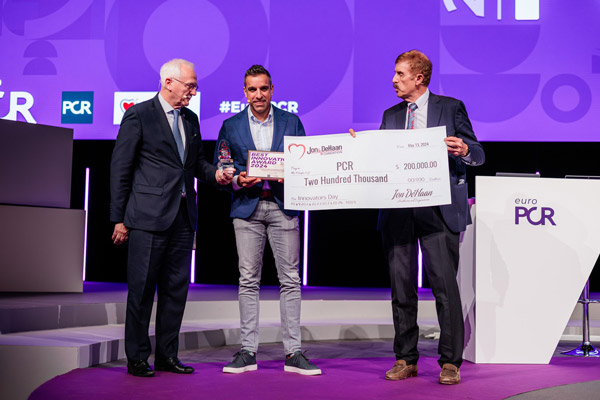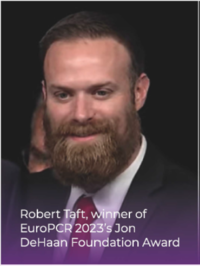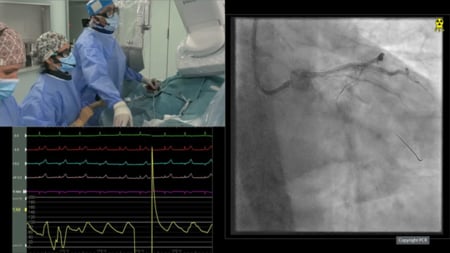15 May 2024
The Jon DeHaan Foundation rewards another innovative idea!
The competition for the Jon DeHaan Foundation Award was tough at PCR lnnovators Day 2024, but the A-FLUX Reducer System was crowned the winner.
Robert Schwartz, President of the Foundation, explained how the award came about: "Jon DeHaan is an amazing man - a grateful patient who had an Ml and a DES - who benefitted from cardiovascular technology and wants to foster additional innovation. We came up with the idea of focusing a section of the Foundation's work on giving innovator awards in collaboration with outstanding meetings like this. Since then, we have given away over 24 grants." He described how there are no strict rules regarding who can enter the competition, "We do not limit ourselves or set arbitrary criteria as we know that some of the best ideas are completely unexpected any novel ideas in the cardiac space are considered. lt's been successful in the past and this year is no exception. We had over 50 submissions to the PCR Committee, across a broad range of topics, and this tells us there is a great deal of interest and innovation."
Dr Schwartz handed over the grant of $200,000 at the ceremony, along with his best wishes for the future of the project. Nicole Karam, one of the Directors of PCR lnnovators Day, said that the award "goes way beyond money." She added, "Getting to the final and winning is a sign of encouragement from the community. lt's recognition for a great idea, it highlights how far the innovator has come and it validates that the project is heading in the right direction. The award is also a gesture of support that there is help available."
The award was given for Rishi Puri's presentation on the A-FLUX coronary sinus reducer. Speaking later, he explained what it means to the team at VahatiCor, Inc. to win the Jon DeHaan Foundation Award competition:
"Firstly, it's a great honour simply to be chosen as a participant, let alone to be considered the 'winner.' Ultimately, we hope that patients will be the winners. The recognition and exposure are nevertheless priceless and critically important for early-phase start-ups to take their innovation to the next level. lt's been a pleasure to embark on this start-up journey with my VahatiCor cofounders, Marwan Berrada-Sounni and Omar Abdul-Jawad Altisent, who along with the great team at VahatiCor have developed a novel next-generation self-expanding coronary sinus reducer for patients with persistent ischaemic heart disease. ln only 28 months, we have been able to deliver the concept, conduct preclinical studies and have now carried out our first-in-human implant and six further implants."

As described by Dr Puri, their innovation addresses an unmet need currently affecting a large population: "Between 30-50% of coronary angiograms performed in daily global clinical practice demonstrate coronary microvascular dysfunction. These patients bear a large symptom burden as antianginal medications are not always effective nor specific at improving coronary microvascular function -they tend to live life suffering without a tailored therapy. Coronary sinus reduction has been shown to acutely and durably improve coronary flow reserve (CFR). ln addition, a dominant proportion of heart failure patients (with preserved function and reduced ejection fraction) harbour significantly impaired CFR. Unfortunately, stenting/ CABG has not been shown to offer additive benefit to medical therapy in improving hard clinical outcomes in patients with ischaemic heart failure and often these revascularisation procedures are high risk.
A coronary sinus-based approach could conceivably non-discriminately modulate and improve CFR in a much more potent way than selective epicardial coronary revascularisation, potentially driving significant improvements in symptoms and hard clinical outcomes." Dr Puri and VahatiCor hope that the A-FLUX Reducer System could help to fill the therapeutic void. Their next steps include trying to raise Series B funding to embark upon planned early feasibility studies.
The 2023 winner of the Jon DeHaan Foundation Award was Robert Taft from NXT Biomedical who described a right to-right shunt between the pulmonary artery and the superior vena cava for patients with heart failure and pulmonary hypertension. Here he tells us what winning meant to him:

How did you feel when you won the award?
This was validation of the collaboration between engineers and cardiologists that results in unique and differentiated insights leading to new therapies. We had great competition in the field so winning this helped to validate the value to patients of a differentiated therapy. That being said, we have much work to do to prove safety and benefit to patients.
This non-dilutive funding is important to our progress.
How has the award helped your innovation to progress over the last year?
This last year, like for many companies, has been a struggle to garner funding adequate to advance our clinical trials the way this promising therapy deserves. The award allowed us to make some additional progress, but we still require more funding to validate feasibility with an adequate number of patients with careful follow-up. The award created a lot of interest which has aided our fundraising efforts.
"The most valuable part of winning is the validation, not that the funding wasn't appreciated. These are tough competitions and you learn a tremendous amount from the feedback and questions. These prepare you for more effective future presentations, whether you win or just compete."



